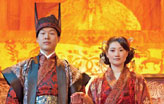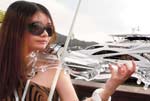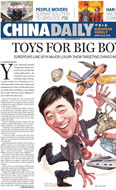Big on Gucci, thin on taste
Updated: 2011-04-15 11:08
By Jacky Jin (China Daily European Weekly)
China's three decades of economic liberalization have achieved some spectacular results. Sustained economic growth - especially a boom in property development and export manufacturing - has created piles of private wealth in recent years. But the caveat is that most of China's new rich still do not have a sense for high-end luxury products and living standards.
Going back 20 years, it's apparent that China has two generations of rich people, each with different styles of consumption.
The first generation is made up of self-made billionaires, such as Zong Qinghou, chairman of Hangzhou Wahaha Group. This generation has endured hardships on the road to riches and their fortunes were apparently earned the hard way. People in this bracket are more often than not averse to risks in consumption and investment and are relatively frugal.
The second generation of China's upper class is the complete opposite, in my mind: They, most of whom are educated overseas, are risk takers in their investments and they enjoy life and luxury goods.
Many within the second generation have strong financial backing from their families and are opening new fronts in private equity and other financial sectors while at the same time keeping the family business. Their spending potential is greater than their parents since they are more confident about the future of their business.
But compared with their counterparts in Europe and the United States, this second generation still needs more lessons on how to live a better life. Most of them have long had a penchant for conspicuous spending on luxury goods. They tend to buy products more for the logo than other factors.
Yachts and private jets appear to be the latest objects of desire for China's uber-rich. At the recent Hainan Rendez-Vous, an exhibition dedicated to purchasing jets, large yachts and other luxury goods in Sanya, some of the richest people in China bought boats and private jets - and I bet that most of them don't really use them for personal leisure. They mainly use their luxurious purchases for entertaining customers and hope the fancy toys generate more clients and business opportunities.
In our yearly report by Robb Report Lifestyle, China's new rich prioritize their wealth by the following: real estate property, cars, gold, then financial products and finally spending on clothes, yachts and travel.
In their travels, most of the billionaires still choose five-star hotels and they don't know that there are boutiques hotels that differentiate themselves from larger branded hotels and motels by providing personalized accommodations, services and facilities.
They still tend to be shopaholics even if the brands they buy are not suitable for them. I would like to take a few examples to demonstrate this point.
A billionaire from Zhejiang
province will travel to Hong Kong many times in a year spending hundreds of thousands of yuan on each visit.
Another example is how the new rich buy first-class tickets. It is really hard to get a first-class ticket from Beijing to Erdos, the richest city in the Inner Mongolia autonomous region of China, since most of the first-class seats between Beijing to Erdos are booked by the wealthiest in advance. You really have to cross your fingers to get a first-class seat on your business trip to this city - a traditionally poor area of China.
The rich people in Erdos booked the first class mainly because they have to travel to Beijing to buy clothes, watches and other luxury goods. They do whatever it takes to ensure they get a first-class seat.
I can understand the shopping behavior of China's new rich. If you imprison a well-behaved professor for five years and keep him semi-starving, will he rush to a book written by Hegel? Or will he rush to a feast of meat? I think he will definitely go for the meat since he suffered a lot of pain and starving in prison.
For the same reason, China's new rich will irrationally throw their money away on buying nice houses, luxurious cars and other luxury goods.
Liang Shuming, one of the most important Chinese philosophers in 20th-century China, said that capitalist mass production seems inevitable - men need to first satisfy basic material needs and then come to spiritual needs. Or in Liang's terms, man needs to first resolve the relationship between man and the physical world.
I think it is hard for a man to develop a good relationship with the physical world. Man needs to learn how to appreciate material products. By spending a great deal of money, man can have ownership of the products, but to lead a better life, man needs to learn to have a better connection with them.
The author is vice-president of publishing at the TRENDS Media Group and publisher of the Robb Report Lifestyle, a Chinese-language edition of Robb Report, a catalog of global luxury resources for the richest of the rich from CurtCo Media Labs.
E-paper

Han me downs
Traditional 3,000-year-old clothes are making a comeback.
Reaching out
Fast growth fuels rise in super rich
Chinese tourists spend more
Specials

Big spenders
More mainland tourists are expected to spend money on overseas travel this year.

Rise in super rich
Report cites rising property prices, gdp as key drivers of increasing number of chinese millionaires.

Reaching out
Condom makers are stepping up their presence in smaller cities to boost sales
